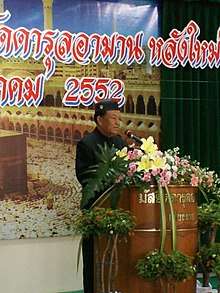Wan Muhamad Noor Matha
| Wan Muhamad Noor Matha | |
|---|---|
| วันมูหะมัดนอร์ มะทา | |
 | |
| Minister of Agriculture and Cooperatives | |
|
In office 6 October 2004 – 11 March 2005 | |
| Prime Minister | Thaksin Shinawatra |
| Preceded by | Somsak Thepsuthin |
| Succeeded by | Sudarat Keyuraphan |
| Deputy Prime Minister of Thailand | |
|
In office 10 March 2004 – 6 October 2004 | |
| Prime Minister | Thaksin Shinawatra |
| Minister of Interior | |
|
In office 3 October 2002 – 10 March 2004 | |
| Prime Minister | Thaksin Shinawatra |
| Preceded by | Purachai Piamsomboon |
| Succeeded by | Pokin Palakul |
| Speakers of the House of Representatives and President of the National Assembly of Thailand | |
|
In office 24 November 1996 – 27 June 2000 | |
| Preceded by | Booneua Prasertsuwan |
| Succeeded by | Bhichai Rattakul |
| Minister of Transport | |
|
In office 13 July 1995 – 24 November 1996 | |
| Prime Minister | Banharn Silpa-archa |
| Preceded by | Vichit Suraphongchai |
| Succeeded by | Suwat Liptapanlop |
| Personal details | |
| Born |
11 May 1944 Yala, Thailand |
| Nationality | Thai |
| Political party | Prachachat Party |
| Other political affiliations | Matubhum Party (until 2018) |
| Alma mater | Chulalongkorn University |
| Profession |
Politician University Lecturer[1] |
| Signature |
|
| Military service | |
| Allegiance |
|
| Service/branch | Volunteer Defense Corps |
| Rank | VDC Gen.[2] |
Wan Muhamad Noor Matha (Thai: วันมูหะมัดนอร์ มะทา; Thai pronunciation: [. wān.muː.hà.mát.nɔː má.tʰāː]; RTGS: Wanmuhamatno Matha), also called Wan Nor, (Thai: วันนอร์; Thai pronunciation: [wān.nɔː]; RTGS: Wanno; born 11 May 1944 in Yala, Thailand) is a Thai Muslim politician. He is a founder of the Wahdah Group, a small lobby of assimilated and integrated Muslim politicians. He is a former university lecturer at Songkhla Rajabhat University and Thaksin University.[3]
Early life
Wan Noor studied Medicine and Management until 1974 at Chulalongkorn University in Bangkok and graduated as Master of Education.
Political career
He was elected to the Thai House of Representatives in 1979, representing Yala Province and the Social Action Party until 1984. He moved to the Democratic Party in 1986, to the Solidarity Party in 1988, and to the New Aspiration Party in 1992. Each time he took a group of representatives from the Muslim-majority provinces of Narathiwat, Pattani and Yala—called "Wahdah Group"—with him. After 1980 he worked in the Ministry of Finance and Industry. From 1994 to 1995, he was appointed Deputy Minister of the Interior and was President (Speaker) of Parliament from November 1996 to June 2000.[4]
Chavalit Yongchaiyudhs New Aspiration Party formed a coalition and eventually merged with the Thai Rak Thai party (TRT) of Prime Minister Thaksin Shinawatra. In 2001 Wan Noor became Minister of Transport and Communications, in October 2002 Minister of the Interior.
As transport minister, he was confronted with a mid-2002 pilot strike. As Home Secretary, he started a war against the drug mafia. In early December, he promised to quash the Muslim uprising in southern provinces by year end. Instead, after rebel violence in 2004 captured Thaksin Ratchaniwet (the Thai king's southernmost palace) in Narathiwat province. Wan Noor was accused of inaction by army chief Chaiyasit Shinawatra, Thaksin's cousin. Although Wan Noor lobby had sought economic uplift of the southern provinces and the introduction of Sharia law at the local level, he was silent following the police massacre of Tak Bai (2004). As of March 2004 he was a Minister without portfolio. From October 2004 to March 2005 Wan Noor became agriculture minister after the electoral defeat of the Wahdah Group. He became a special envoy managing the Thai aid effort following the earthquake in Pakistan.
After the 2006 Thai coup d'état and Thaksin's fall, Wan Noor was appointed Director of the National Drug Control Centre and promised vigorous action. He initially joined the TRT's successor party People's Power Party in 2008, but at the time a five-year ban on political activity was enforced. The Wahdah Group evolved into the Matubhum Party.
References
- ↑ https://www.ryt9.com/s/refb/235470
- ↑ http://www.ratchakitcha.soc.go.th/DATA/PDF/00124653.PDF
- ↑ http://wiki.kpi.ac.th/index.php?title=%E0%B8%A7%E0%B8%B1%E0%B8%99%E0%B8%A1%E0%B8%B9%E0%B8%AB%E0%B8%B0%E0%B8%A1%E0%B8%B1%E0%B8%94%E0%B8%99%E0%B8%AD%E0%B8%A3%E0%B9%8C_%E0%B8%A1%E0%B8%B0%E0%B8%97%E0%B8%B2
- ↑ Nakamura, Mitsuo; Sharon Siddique; Omar Farouk Bajunid (2001). Islam & Civil Society in Southeast Asia. Institute of Southeast Asian Studies. p. 104. ISBN 9789812301116.